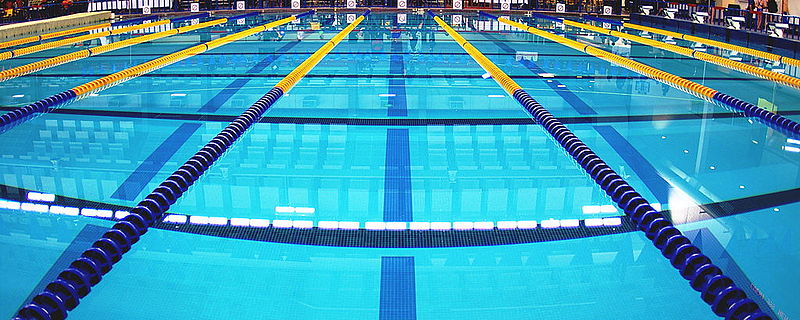When you swim freestyle, if you have your head in the right position, your neck is long and un-crooked and your eyes are looking straight down at the black line of tile on the bottom of the pool. Your head is in line with the rest of your body, with just the back of it at the surface of the water. The temptation is to bend your neck back so the crown of your head erupts from the water and your eyes are looking forward, finding the wall or the swimmer in front of you or whatever’s next. There’s no need for this, since it creates unwanted drag in the water, changing your form from one long line to a shorter line with a lump at the end of it. Also, that’s what the black line is for.

The black line tells you everything you need to know about what’s coming up ahead. It changes into a T just before the wall, giving you plenty of time to prepare for your turn without running head first into the wall. After the turn, there it is again, leading the way.
I swim several miles a week so I spend a lot of time staring down at the black line, reminding myself it is, indeed, the correct position. When I find my head pulling back and looking forward I remind myself again and resume my black line gaze. When my competitive nature kicks in and I want to look sideways at the next lane to see how I compare to that other swimmer, I move my head back to the correct position. In line, eyes on the line.
My other temptation is getting ahead of myself in the count. If I am at 16 laps and my plan is to switch strokes when I get to 20 laps, my mind starts to calculate and plan about that next set of 20 laps. A lap or two goes by while I’m busy in my head and I realize I’ve lost count. Was that 16 or 18? Or, I’m at 16 laps and I start scheduling my day, calculating meeting times and how long it will take to accomplish certain tasks, and whether I have time to call so-and-so, and if I’ll feel like vacuuming when I get home, and if not, will I care or fret…Was that 16 or 18? How long was I lost in my head just then? My body’s floating in chlorinated water but for that lapse of time I was really someplace else.
As in swimming, so in life. Staying right where I am, eyes and attention focused on exactly what I’m doing now, is one of the hardest spiritual disciplines. I constantly want to consider the next 20 laps while I’m trying to make it through this 20. It’s too easy to lose track that way, to do a poor job on the laps at hand, to develop the bad habit of never inhabiting the present moment while always planning for the future moments.
Monastic communities engage in a practice called “custody of the eyes” and lately I’ve been thinking about that phrase as I remind myself to keep staring at the black line in the pool. The idea is to keep your eyes to yourself, both to preserve your spiritual equilibrium and to give privacy and respect to others. It’s often evoked when talking about ogling people in a sexual way, but Catholics also speak of practicing custody of the eyes during Communion, keeping one’s gaze down, away, and internally focused. In monastic communities, custody of the eyes enables people to live, work, and pray in intimate quarters while preserving privacy. Where our eyes land, so does our attention. Keeping custody of the eyes is about working on your own stuff, whether you’re in a crowd at church or walking down the street alone, and it’s about being present to what’s before you right now.
Out of the pool I wear glasses. In the pool I wear non-prescription goggles. I can’t see the expression on the lifeguard’s face but the goggles cut the water’s fuzziness just enough that I can see the black line. This would not be good enough in land life but it’s more than sufficient in the water. Maybe it’s even better, helping keep me focused on the only thing I can really see, the black line orienting me to the right position and the next stroke, and the next.
*
photo credit: Adapted from original photo © 2011 Xander, CC BY-2.0

Thank you. (I live in a monastery, and your example of watching the black line while swimming is very helpful!)
Oh, I’m so glad this resonates. Thank you for reading!